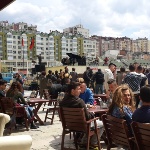by Besar Likmeta, for Balkan Insight, 29.04.2015
A large pedestrian overpass in the Dardania neighborhood of Pristina, fondly nicknamed the “Spine” by locals, was transformed into a stage last Friday.
Nishliu and her band performed several songs from her new album, “With our motifs”, at a concert.
The singer and her jazz quartet set up shop on the roof of a hairdressing salon at the centre of the Spine, an area of concrete apartments blocks on the outskirts of the Kosovo capital, as surprised onlookers stopped to capture the sight on smart phones.
“Some of the songs on this album I have grown up with, listening to in different versions,” Nishliu said a few days before the concert, in an interview in a bustling Tirana café.
“Our goal was to dust down these old Albanian treasures and rearrange them under new rhythms, to draw a new audience from the Albanian-speaking areas in the region and beyond,” she added.
With its underground labyrinth of shops and cafés, during the Nineties the Spine served as the cultural hub for Albanian performing arts in Pristina, at a time when Kosovo’s majority ethnic Albanian population lived a segregated life under the regime of the Serbian strongman Slobodan Milosevic.
Between one song and another, Nishliu explained to her impromptu audience on Friday that she had chosen the overpass as a stage in order to commemorate this bygone era and its significance, which is being lost in now independent Kosovo.
Nishliu’s new album is part of a project supported by Albania’s Prime Minister’s office, the culture ministries of Kosovo and Albania and the municipality of Pristina, as part of a joint cultural programme agreed between the two countries.
One May 1, Albanian Prime Minister Edi Rama will serve as the host of her next concert in Tirana, which will be held in a recently revitalized park on the grounds of the government offices.
The album draws on the Albanian musical legacy in the Balkans, but also on the traditions of the centuries-old émigré communities in Greece and Italy.
Apart from the album, the project envisages the production of several videos and a promotional campaign, which will target the local and international media with the aim of promoting Albanian culture and music.
Nishliu says the project has been in the making since 2011, when she held her first solo concert with Tirana pianist Gent Rushi, featuring the Kosovo folk Rugova ensemble as guests.
The project was interrupted after she was selected to represent Albania in the Eurovision song contest held in Baku in 2012 and she only returned to her original idea last September.
Nishliu explains that earlier stages of the project, between 2012 and 2014, included meticulous research of different versions of old Albanian songs, while the second stage was transforming them through “free jazz” techniques.
“My interest has always been to draw on tradition and to bring to it newer rhythms that my audience is drawn to,” Nishliu said. “This is a project that represents me as an artist but also where I come from,” she added.
Born in the ethnically divided northern Kosovo town of Mitrovica, Nishliu left the town in 1999, after Serbian forces beat up her father and set her home ablaze, as part of the campaign by the Milosevic regime to ethnically cleanse Kosovo of its Albanian population.
After moving to Pristina at the age at 13, she came to prominence as a member of the girl group Flakareshat and later as a solo jazz singer and songwriter, known for her powerful voice and experimental singing style, which fuses jazz and soul music.
Her Eurovision performance with the song “Suus” in Baku, Azerbaijan, where she came fifth, won her international accolades and drew the attention of the international press, making her music accessible to a wider audience.
The song has been performed in such far-flung countries as Ukraine and the Philippines, featuring in television song contests and generating media coverage about the singer.
In September 2014, Nishliu was invited to perform in the Dober Dan festival in Belgrade.
Despite being greeted by a small group of protestors wearing T-shirts reading “Kosovo is Serbia”, the audience in the philharmonic hall in Belgrade welcomed her performance and the daily newspaper Danas followed it with a rave review.
Although accustomed to invitations to perform internationally since the Eurovision song contest, Nishliu says the fraught history between Kosovo and Serbia meant that this was no ordinary event.
“I can’t say it was like any other invitation…because of our recent joint history,” she recalled. “However, art provides the possibility to challenge even yourself,” she added. “My art is for everyone… and I try my best with my work to represent my culture,” she concluded.
article posted by:Rona Nishliu, Nishliu, Rona



